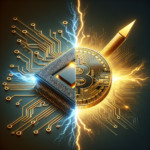Understanding Smart Contracts
What Are Smart Contracts?
Smart contracts are self-executing contracts with the terms of the agreement directly written into code. They run on blockchain platforms, which provide a decentralized and secure environment. Once deployed, smart contracts automatically enforce the stipulated actions when specific conditions are met, eliminating the need for intermediaries.
Importance of Choosing the Right Blockchain
The choice of blockchain platform plays a crucial role in the development, deployment, and execution of smart contracts. Factors such as security, scalability, transaction speed, and community support can significantly influence the success of a smart contract project.
Popular Blockchain Platforms for Smart Contracts
Ethereum
Overview
Ethereum is the pioneer in the smart contract space, introduced in 2015. Its flexibility and robust community support have cemented its place as a leading platform for developers.
Key Features
– **Turing-Complete Language**: Ethereum supports Solidity, a Turing-complete programming language that enables developers to create complex smart contracts.
– **Large Community**: A vast and active developer community provides extensive resources, tutorials, and libraries, making it easier for newcomers to enter the ecosystem.
– **Network Decentralization**: Ethereum’s decentralized nature ensures transparency and security for the execution of smart contracts.
Challenges
– **Scalability Issues**: Ethereum’s network can become congested, leading to slow transaction times and higher gas fees.
– **Transition to Proof of Stake (PoS)**: Ethereum is in the process of transitioning from PoW (Proof of Work) to PoS, which may introduce temporary uncertainties.
Binance Smart Chain (BSC)
Overview
Launched in 2020, Binance Smart Chain aims to provide a fast and low-cost alternative to Ethereum for DeFi applications and dApps.
Key Features
– **Low Transaction Fees**: BSC offers significantly lower transaction fees compared to Ethereum, making it attractive for users and developers.
– **EVM Compatibility**: BSC is compatible with Ethereum Virtual Machine (EVM), allowing Ethereum developers to port their dApps with little effort.
– **High Throughput**: BSC supports faster transaction processing, making it suitable for high-load applications.
Challenges
– **Centralization Concerns**: BSC utilizes a limited number of validators, which raises questions about its decentralization and security.
– **Less Established Community**: While growing, BSC lacks the extensive developer resources and community support found in Ethereum’s ecosystem.
Cardano
Overview
Founded by one of the co-founders of Ethereum, Cardano takes a research-driven approach to blockchain technology. Launched in 2017, it aims to provide a more secure and sustainable platform for smart contracts.
Key Features
– **Ouroboros Protocol**: Cardano uses a unique proof-of-stake mechanism that emphasizes security and energy efficiency.
– **Formal Verification**: Cardano supports formal verification, which helps ensure that smart contracts behave as intended, reducing the risk of bugs and vulnerabilities.
– **Layered Architecture**: The network separates the settlement and computation layers, enhancing flexibility and scalability.
Challenges
– **Slow Development Pace**: Cardano’s emphasis on thorough academic research can slow the development and release of features.
– **Limited Adoption**: Compared to Ethereum, Cardano has a smaller ecosystem, which can be a barrier for developers looking for robust community support.
Tezos
Overview
Tezos is designed to evolve while minimizing the disruptions associated with major updates. Launched in 2018, its self-amending feature is a standout.
Key Features
– **On-Chain Governance**: Tezos allows stakeholders to vote on protocol upgrades, reducing the risk of hard forks and ensuring continuous evolution.
– **Formal Verification**: Similar to Cardano, Tezos also supports formal verification, which bolsters security for complex smart contracts.
– **Low Transaction Fees**: Tezos offers low fees for transactions, making it appealing for users and developers alike.
Challenges
– **Limited dApp Ecosystem**: Compared to Ethereum and even BSC, Tezos has a smaller number of decentralized applications, which might deter developers.
– **Complexity of Learning**: Tezos uses Michelson, which can be more challenging to learn compared to Solidity.
Solana
Overview
Launched in 2020, Solana has gained attention for its incredibly fast transaction speeds and low fees, making it an appealing platform for developers of high-performance applications.
Key Features
– **High Throughput**: Solana can handle thousands of transactions per second, which is crucial for applications requiring speed, such as high-frequency trading.
– **Low Fees**: Transaction costs on Solana are a fraction of a cent, attracting developers interested in scalable solutions.
– **Focus on DeFi and NFTs**: Solana has rapidly become a go-to platform for decentralized finance projects and NFT marketplaces.
Challenges
– **Network Stability**: Solana has faced occasional network outages that raise questions about its reliability.
– **Growing Ecosystem**: While rapidly expanding, Solana’s ecosystem might still lack the extensive resources and libraries available in more established platforms like Ethereum.
Key Factors to Consider When Choosing a Platform
Security
Security is paramount in blockchain technology. Choose a blockchain with a proven track record and robust security measures, such as formal verification features.
Scalability
As your project grows, it’s crucial to select a platform that can handle increased demand. Look for platforms with high throughput and low transaction fees.
Community Support and Resources
The availability of developer resources, tutorials, and community support can significantly ease the development process. A vibrant community can also offer timely help when issues arise.
Development Language
The language used for writing smart contracts is vital for compatibility and ease of use. Consider whether the programming languages supported by the blockchain align with your development team’s skill set.
Governance and Upgradability
Evaluate how the platform approaches governance and upgrades. A system that allows for smooth protocol updates without hard forks can offer long-term stability and adaptability.
Conclusion
Selecting the right blockchain platform for smart contracts requires a nuanced understanding of various factors. Each platform has its strengths and weaknesses, catering to different needs and use cases. By assessing your project’s specific requirements, you can make an informed decision on the best blockchain to facilitate your smart contract endeavors.









